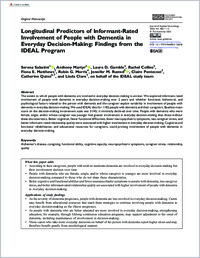Longitudinal predictors of informant-rated involvement of people with dementia in everyday decision-making : findings from the IDEAL program
- Sabatini, Serena ORCID Faculty of Biomedical Sciences, Università della Svizzera italiana, Switzerland
- Martyr, Anthony ORCID Centre for Research in Ageing and Cognitive Health, Faculty of Health and Life Sciences, University of Exeter Medical School, Exeter, UK
- Gamble, Laura D. ORCID Population Health Sciences Institute, Newcastle University, Newcastle, UK
- Collins, Rachel Centre for Research in Ageing and Cognitive Health, Faculty of Health and Life Sciences, University of Exeter Medical School, Exeter, UK
- Matthews, Fiona E. ORCID Population Health Sciences Institute, Newcastle University, Newcastle, UK
- Morris, Robin G. Department of Psychology, King’s College London, Institute of Psychiatry, Psychology and Neuroscience, London, UK
- Rusted, Jennifer M. ORCID School of Psychology, University of Sussex, Brighton, Brighton, UK
- Pentecost, Claire Centre for Research in Ageing and Cognitive Health, Faculty of Health and Life Sciences, University of Exeter Medical School, Exeter, UK
- Quinn, Catherine Centre for Applied Dementia Studies, Bradford University, Bradford, UK - Wolfson Centre for Applied Health Research, Bradford, UK
- Clare, Linda ORCID Centre for Research in Ageing and Cognitive Health, Faculty of Health and Life Sciences, University of Exeter Medical School, Exeter, UK
- 2022
Published in:
- Journal of applied gerontology. - 2022, vol. 42, no. 2, p. 290–301
Alzheimer’s disease
Caregiving
Functional ability
Cognitive capacity
Neuropsychiatric symptoms
Caregiver stress
Relationship quality
English
The extent to which people with dementia are involved in everyday decision-making is unclear. We explored informant-rated involvement of people with dementia in everyday decision-making over 2 years and whether functional, behavioral, and psychological factors related to the person with dementia and the caregiver explain variability in involvement of people with dementia in everyday decision-making. We used IDEAL data for 1182 people with dementia and their caregivers. Baseline mean score on the decision-making involvement scale was 31/45; it minimally declined over time. People with dementia who were female, single, and/or whose caregiver was younger had greater involvement in everyday decision-making than those without these characteristics. Better cognition, fewer functional difficulties, fewer neuropsychiatric symptoms, less caregiver stress, and better informant-rated relationship quality were associated with higher involvement in everyday decision-making. Cognitive and functional rehabilitation, and educational resources for caregivers, could prolong involvement of people with dementia in everyday decision-making.
- Collections
- Language
-
- English
- Classification
- Medicine
- License
- Open access status
- hybrid
- Identifiers
-
- DOI 10.1177/07334648221128558
- ARK ark:/12658/srd1325634
- Persistent URL
- https://n2t.net/ark:/12658/srd1325634
Statistics
Document views: 112
File downloads:
- Sabatini_2022_SAGE_jag: 150
